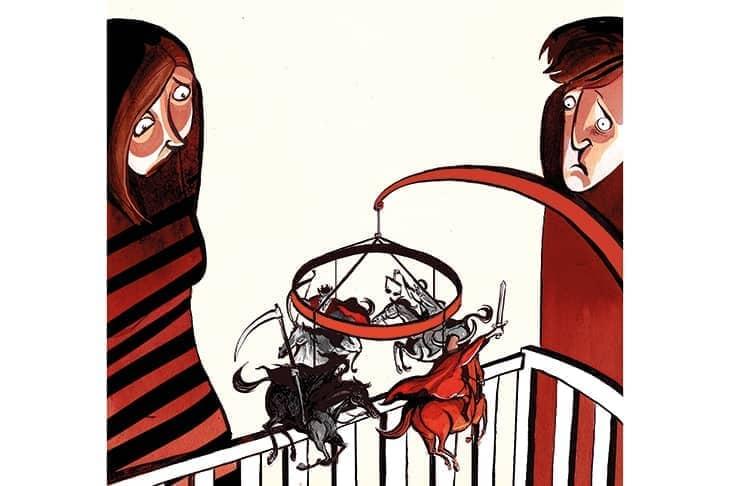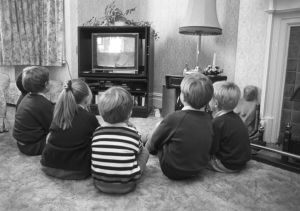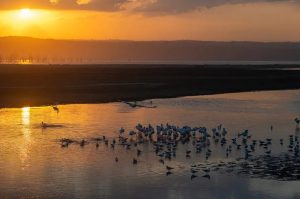For much of the last century, people had good reason to wonder whether it made sense to have babies. Millions of young men had died or been maimed in the trenches, and then along came the risk of being pulverized by an atom bomb.
Nonetheless, men and women continued to have children and after both world wars there was a baby boom. As C.S. Lewis wrote in 1948: ‘It is perfectly ridiculous, to go about whimpering and drawing long faces because the scientists have added one more chance of painful and premature death to a world which already bristled with such chances.’
Somehow, we have lost this perspective. Back then, in the 20th century, schools taught young people to keep calm and carry on. Now, we’re teaching them to panic. A relentless focus on the challenges of climate change, intended to persuade people to take the environment seriously, has instead created a culture of despair. Men and women who might otherwise have families have become so burdened with guilt and so worried about the effect humans have on the environment that they’ve become blind to the fact that there’s never been a better time to have babies.
Falling birth rates are, for the most part, a sign of a country becoming wealthier: when incomes rise, family sizes tend to shrink. Academics, however, have begun to identify a new reason for the sharp decline in the number of babies in the West: ‘climate anxiety’. A global poll of young people published in the Lancet last month shows that 39 percent feel ‘hesitant to have children’ due to climate change. A University of Arizona study identified three concerns: overconsumption, overpopulation, and an uncertain future.
What we once perhaps dismissed as the fringe fear of a small number of activists is now a force in world demographics. In a research note published last month, Morgan Stanley told clients that the ‘movement to not have children owing to fears over climate change is growing and impacting fertility rates quicker than any preceding trend’.
The change in those rates is striking. The US fertility rate stands at 1.7 births per woman, half that of the 1950s. In Britain it’s 1.6, in Italy it’s 1.3. Tom Woodman’s article confesses that he feels it is his moral duty not to have children, both so as not to contribute to global warming and so that his children don’t suffer as the world ends.
The tragedy of this position is that this anxious generation’s fears are largely unfounded. Children born today are likely to have longer and better lives than those in any other era. They’ll be better educated with fewer health worries, and have more rewarding work than previous generations could have dreamed of. Just a century ago, a third of children wouldn’t make it to their fifth birthday. Now the global child mortality rate is 4 percent. Parents today spend twice the amount of time with their children as they did 50 years ago. Air quality is better now than it has been at any time in living memory.
It’s easy to lose sight of this progress when the focus of the government is on the horrors that await us in the future. Just this week, the Environment Agency released its new message: ‘Adapt or die’, it’s in the same apocalyptic vein as Greta Thunberg’s approach — constant talk of worst-case scenarios, and demands that everyone ‘panic’. The obsession with doomsday might grab headlines, but it’s wasted energy that does nothing to solve the issues we might face from climate change.
I trained as a teacher in Scotland, where until recently geography pupils were encouraged to examine the positive effects of climate change as an exercise in critical thinking. They could look, for instance, at the IPCC’s latest report on climate change which, in addition to warming, noted that ‘the frequency and intensity of cold extremes have decreased’. After protests from the public and from politicians, this exercise was removed from the curriculum.
The story of our future is spelled out by documents like the IPCC’s sixth assessment report, released ahead of the COP26 summit in Glasgow next month. Described by the UN secretary-general as a ‘code red’ warning for humanity, there was much in it to be concerned about: potential famines, droughts, disease, displacement, and severe poverty as our planet continues to heat under human influence. Quality of life, having trended upwards for decades, could slump back to what it was in the 1980s.
If the worst happens, millions of people (most of them poor) will die prematurely. There will be devastations and disasters the world over. To be sure, this can certainly be described as an impending catastrophe or crisis. But even if it comes to pass, it is not — the scientists agree — an existential threat to civilization. It’s hard to find, even in the IPCC documents, predictions of a world too dangerous to raise children in.
To maintain some perspective, consider how brutal life must have been for most of our ancestors. Before the 20th century, next to no one expected to live into very old age. Almost everyone, by the end of their childhood, had had at least one sibling or parent die. Women were fortunate if they were educated, and even more fortunate if they had any say in who they married. Millions were enslaved. Millions more were wiped out by plagues, famines, sickness and wars. All this without the countless technologies and comforts we now enjoy. And yet those who came before evidently did not give up on life, since here we all are.
What would really threaten the survival of our species is if we were to stop reproducing. Bizarrely, though, some are offering this as their personal contribution to the cause. When Prince Harry and Meghan promised to ration themselves to two children — so as not to burden the planet — they were just the latest in a long line of people (including Rep. Alexandria Ocasio-Cortez) to talk as if humanity is the problem and the future world will be perhaps too dangerous to inhabit.
What’s strange about the new eco-pessimism is that the people making these arguments are not found in sub-Saharan Africa, whose people have the greatest cause to complain about misery, but in the world’s most affluent places at the best time in history to be alive. And at a time when the bigger problem facing these societies is a low birth rate, skewed demographics, and an aging society.
Global fertility rates are falling, not rising. As countries get wealthier, women tend to start working and family size tends to shrink. The global population is set to peak in 2064, according to a recent study in the Lancet, so we may only have a few decades left of rising population. A baby bust is already sweeping Europe, North America and China, causing problems of its own. The Chinese Communist party, having abandoned its notorious one-child policy, is now encouraging women to have up to three children. So far, it seems that the Chinese are in no rush to do so.
The key to navigating our way through the challenges associated with climate change lies in sober thinking. While our own children can expect a bright future, we can — and should — do plenty to help those who will be worst affected. Those of us living in the first world today are the luckiest people ever to have lived — and the odds are that the generation to come after us will be luckier still.
This article was originally published in The Spectator’s UK magazine. Subscribe to the World edition here.


















